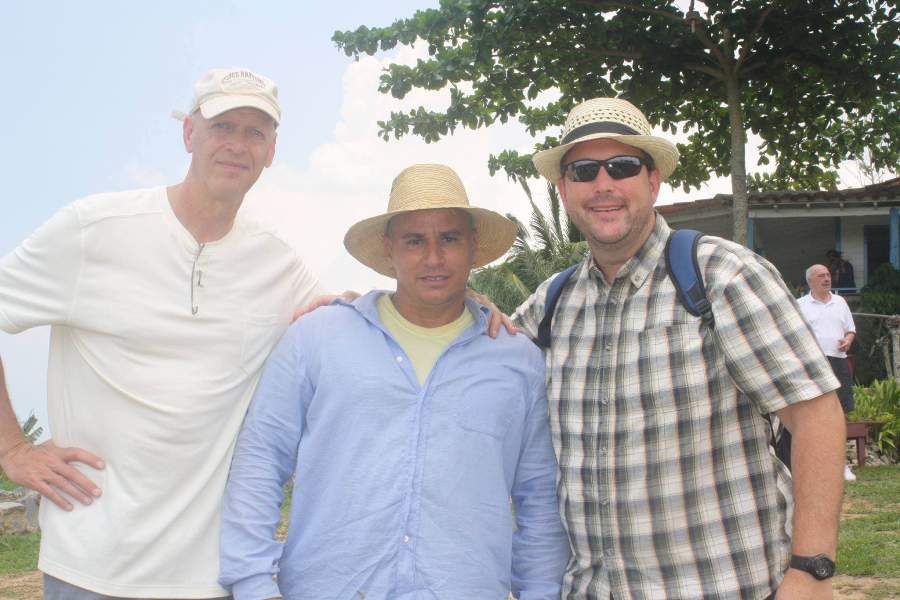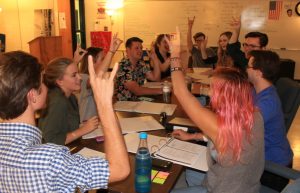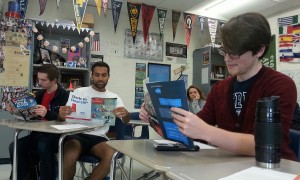Cuba offers more than just a command economy
Economics teachers Walter Ellison and Mark Decourcy stand on a local farm in Viñales, Cuba, next to its property owner. Ellison and Decourcy voyaged to Cuba this past summer looking for hands-on economic insight of how a command economy functions around its citizens.
September 21, 2016
“Overseas travel has been the experience that opened my eyes to what it means to be a world citizen,” Ellison said.
In recent years the social studies department expressed major interest in overseas travel to enhance their student’s overall experience in the classroom. This past summer, Economics and Government teachers Walter Ellison and Mark Decourcy traveled to Cuba, a country that has been closed off to the American public for over 50 years. This trip would serve as an asset to teacher curriculum mainly because Cuba is one of the closest examples of a command economy to date. By sharing their personal experiences with their classes, it will allow students to grasp the concept of a command economy with a firmer hand.
Although it may be illegal for Americans to travel to the country solely for tourism, Americans are able to waiver those travel restrictions by entering with a distinct purpose. Ellison and DeCourcy traveled with 18 other teachers, their titles as educators permitting them into the country. All 20 teachers are members of the Georgia Council on Economic Education.
According to their website, the GCEE bases their mission statement around wanting to prepare “teachers to teach economics in inspired ways, so that students can grow up to be economically literate citizens.”
Before boarding the plane, the teachers had to take certain steps before arriving. All the teachers attended a college course and analyzed reading material that correlated with would be covered on the trip. Then they reconvened to discuss any questions they might have with the guest speakers who accompanied them throughout the trip.
Back in 2007, before he was officially a part of the department, Ellison worked as social studies collaborative teacher as well as a special education teacher. During this time, a fellow co-worker in the department suggested he apply for the GCEE grant opportunities since he had always been interested in furthering his background in social studies.

During mid-day, the Cuban flag waves in the wind by the harbor overlooking Havana, Cuba.
Up until three years ago Ellison had never left the the country so, for him, these trips were a way to “go places [I’ve] never been before and to learn from other people,” Ellison said. His first excursion was to Germany with Transatlantic Outreach Program, whose mission is similar to GCEE’s, to promote the knowledge of Germany while allowing North American educators to experience it first hand. “The people who plan and run the TOP trip exceed expectation,” Ellison said.
In the following years Ellison visited Japan and Cuba with similar intentions. Before actually arriving in Cuba, Ellison had his own preconceived ideas on how it would be. He thought that “they don’t know what true capitalism is” but to his surprise, the Cubans “are far from naive,” Ellison said.
Although the trip to Cuba was an out-of-pocket investment, the people from GCEE put the participants in touch with other organization projects that would reimburse them for most of the cost. These projects included writing, editing, or criting economy lessons. Ellison has written two lessons, one of which is about an American baseball bat company, while Decourcy is a lesson editor.
As a former GCEE teacher of the year, Decourcy excitedly accompanied Ellison on the trip to Cuba. Decourcey enjoys these trips because the subjects covered “falls in lockstep with the curriculum,” Decourcey said.
History teacher Rebecca Rickeard also had experiences to share with her students. After spending a busy summer in Washington D.C. for an AP European History event, she enlightened its attendees with her own AP European History presentation.
After such a busy summer, Ellison, Decourcy, and Rickeard expect their experiences to be helpful in the classroom. “These trips allow [us] to share personal experiences with the students throughout the year,” Decourcey said.








